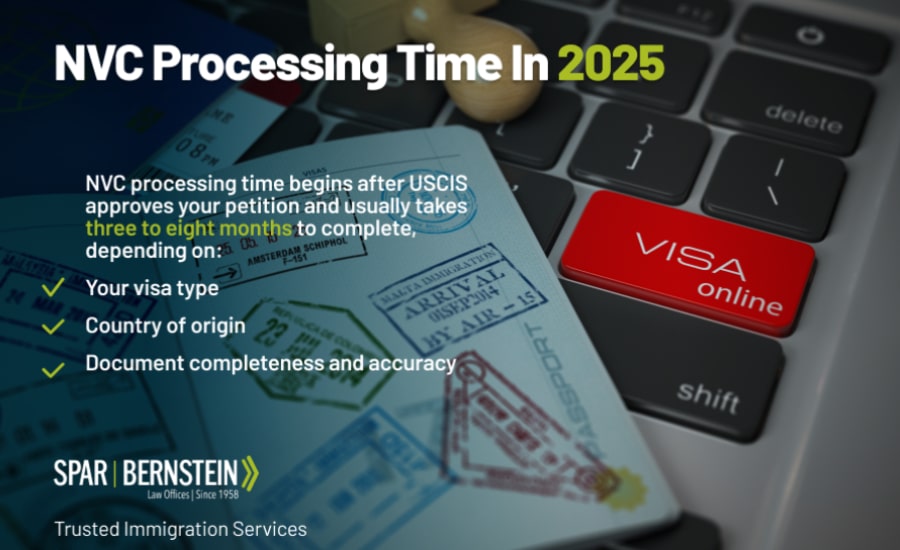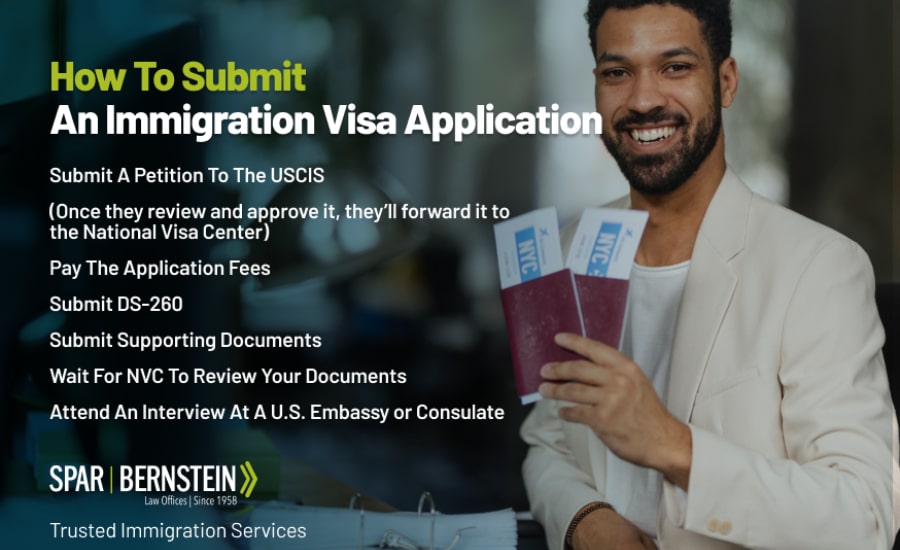

National Visa Processing Time: Key Points
- NVC processing typically takes three to eight months, but timelines vary based on your visa type, country of application, and document accuracy.
- Your case will not begin processing at the NVC until USCIS approves your petition and transfers it to the NVC.
- Delays often occur due to missing or incorrect documents, incomplete applications, or high demand at certain U.S. embassies and consulates.
- You can track your application online using the CEAC portal and submit inquiries if your case takes longer than expected.
- Working with an experienced and knowledgeable immigration lawyer can improve your chances of a successful outcome.
If you’re applying for an immigrant visa through family, employment, or another qualifying category from the country in which you were born or the country of your permanent residence, you must go through consular processing, which involves the National Visa Center (NVC).
Understanding NVC processing time is key, as this impacts how soon you can move forward in your immigration journey.
- We’ll walk you through:
- NVC processing time
- Factors affecting the timeline
- NVC process steps
- Answers to common questions
NVC Processing Time: How Long Does It Take?
The NVC may take three to eight months to review your application.
NVC processing time starts after your petition is approved by the U.S. Citizenship and Immigration Services (USCIS) and your case is transferred to the National Visa Center.
At this stage, the NVC will begin pre-processing and send you notification of your immigrant visa number and login information to access your case on their Consular Electronic Application Center (CEAC). Shortly after, the NVC will email you to request processing fees and documents to begin your consular processing case.
Once you pay the fees and submit the required documents, the NVC will begin reviewing your documents before scheduling a visa interview at a U.S. embassy or consulate abroad.
An interview can be scheduled only after your priority date (the date your petition was filed with USCIS) becomes current, meaning that a Green Card is available for your category on the Department of State’s Visa Bulletin.
Form I-797, the Notice of Action letter you received from USCIS contains your priority date. The visa bulletin is released each month and contains the country, visa limits, and the date for the respective type of visa being processed that month. The NVC uses this visa bulletin to determine which priority dates are current for fee and document requests during consular processing.
There are no annual limits for immediate relative categories. However, each year, there are limits on the visas granted for family preference and employment-based immigrant categories, and this can result in long wait times, spanning from several years to decades.
What Factors Affect NVC Processing Time?
The National Visa Center’s processing time can vary depending on several factors, including:
- The type of immigration visa: Family preference and employment-based immigrant categories tend to take longer due to annual limits
- The country from which you apply: Some consulates may be busier than others
- The documents you submit: If you do not include everything as required, your case is likely to be delayed

How To Submit Your Immigrant Visa Application
So, how does the immigrant visa application process work? Here’s a step-by-step guide:
1. Submit A Petition
The first step is to file your application with USCIS. Depending on your visa category, use Form I-130, Petition for Alien Relative, or Form I-140, Immigrant Petition for Alien Workers.
USCIS will send you a receipt notice confirming that your application has been received.
Once USCIS reviews and approves your petition, they will forward it to the National Visa Center for further processing.
NVC will add your case to their database — typically referred to as pre-processing.
The NVC will then send you a welcome letter with your immigrant visa number.
2. Pay The Application Fees
Once you receive the NVC welcome letter, go to the Consular Electronic Application Center (CEAC) website to login and pay:
- Your initial Immigrant Visa Application Processing Fee
- Your Affidavit of Support Fee
3. Submit DS-260
Log onto the CEAC website and submit the DS-260 Immigrant Visa Electronic Application, along with civil documents as per your country’s specific requirements.
Fill out the form with the required information:
- Biographical information
- Immigration history
- Employment and education details
- Travel and background information
Print the confirmation page after completing the DS-260; you will need to take it to your interview.
4. Submit Supporting Documents
The NVC will confirm receipt of your DS-260 after you file it.
You then need to file additional supporting documents as evidence of your visa eligibility — you can do this online, by email, or by mail, depending on which U.S. embassy or consulate is processing the application and when your immigrant visa case was created.
Depending on the type of visa application, supporting documents might include:
- Evidence of your sponsor’s U.S. citizenship or lawful permanent residency
- Evidence of relationship to the sponsor, such as a birth, marriage or adoption certificate
- Evidence of income, such as a letter from the sponsor’s employer or paystubs
- Proof of your sponsor’s filed tax returns for at least the previous year with W-2s
- Proof of assets
If you are uploading the supporting documents to the CEAC’s website:
- Limit file sizes to 2MB
- Verify that all documents are submitted in full and are easily legible
- Rotate the documents as needed
- Upload all documents in color using .pdf or .jpg format
- Upload translated files together with the original document
- Do not upload zip files or password-protected files
To help the NVC understand the relation of each document to your application, create a table of contents and include a brief description of each document.
5. Wait For NVC To Review Your Documents
After your application is reviewed, the NVC will reach out to you to inform you that your case is “documentarily qualified” and set up an interview, which is the final step of the process.
If there are issues with your submission, the NVC may send you a “Checklist Letter,” outlining missing or incorrect items. Re-upload any corrected or missing documents before your case can be processed.
6. Attend An Interview At A U.S. Embassy or Consulate
After your case is documentarily qualified and your priority date is current (per the Visa Bulletin), the NVC works with the appropriate embassy or consulate to schedule your interview.
You’ll receive:
- Interview appointment letter
- Instructions for medical exams and required documentation to bring
Usually, the U.S. Embassy or Consulate will inform you whether to grant or deny your application after your interview.
If your immigrant visa is approved, you will be informed of when and how to collect your passport and visa. If your immigrant visa is denied, you will be informed of the reasons for the denial.

What To Do If Your Immigrant Visa Is Taking Too Long To Process
If your case appears stalled or has been at NVC for longer than expected:
- Contact the NVC: Submit a public inquiry via the NVC Inquiry Form.
- Check your CEAC account: Look for any notifications, checklists, or updates.
- Seek legal assistance: An experienced immigration attorney can follow up directly and reduce delays.
National Visa Processing Time: Key Takeaways
- NVC processing begins after USCIS has approved your petition.
- The average processing time is three to eight months and can vary based on your visa category, country of origin, and document completeness.
- Working with an immigration lawyer can help ensure your application is accurate and complete, reducing the risk of processing delays.
- You can check your case status and submit inquiries through the CEAC portal.
How Spar & Bernstein Can Help With Your Immigrant Visa Application
Representing immigration clients in all 50 states and worldwide since 1958, our attorneys at The Law Offices of Spar & Bernstein specialize in different areas of immigration law, from family and employment immigration to investor visas, and citizenship and naturalization.
If your application for lawful permanent residence in the U.S. is stuck between the responsible agencies or you need additional legal support, our experienced immigration lawyers will:
- Determine your case status
- Check your eligibility for expedited visa processing
- Help you compile and submit any missing documents that may be causing a delay
- Represent you at every stage of consular processing
- Help you prepare for the interview
To get an idea of how we can help you and read about some of our past immigration clients, explore some of our immigration success stories.
Approaching each case with professionalism and compassion, our lawyers at Spar & Bernstein fight for the ideal outcome in each client’s immigration case.
We have helped more than 100,000 people obtain immigration benefits and realize their American dream — and we’d be honored to be a part of your own success story.
National Visa Processing Time: FAQs
For more information about NVC and processing times, check out the section below.
What is the NVC?
The National Visa Center (NVC) is a government agency that processes immigrant visa applications for individuals who want to obtain permanent residence in the U.S. (a Green Card).
What is the role of NVC?
The National Visa Center acts as an intermediary between the United States Citizenship and Immigration Services (USCIS) — the first authority to authorize an immigrant visa petition — and the U.S. Embassy or Consulate, where the applicant will attend an immigrant visa interview.
What kind of petitions does NVC process?
The NVC processes family sponsored and employment-based immigrant petitions for applicants who live outside of the U.S.


